Mario vs. Donkey Kong (series): Difference between revisions
No edit summary |
m (Text replacement - "Mini Bowser" to "Mini Bowser") |
||
| (189 intermediate revisions by 55 users not shown) | |||
| Line 1: | Line 1: | ||
{{italic title | {{italic title}} | ||
{{ | {{series infobox | ||
|image=[[File:MvsDK NS Logo.png|200px]] | |||
|image=[[File: | |||
|first=''[[Mario vs. Donkey Kong]]'' ([[List of games by date#2004|2004]]) | |first=''[[Mario vs. Donkey Kong]]'' ([[List of games by date#2004|2004]]) | ||
|latest='' | |latest=[[Mario vs. Donkey Kong (Nintendo Switch)|''Mario vs. Donkey Kong'']] ([[Nintendo Switch]]) ([[List of games by date#2024|2024]]) | ||
|number= | |number=8 (7 main, 1 remake) | ||
| | |franchise=''[[Super Mario (franchise)|Super Mario]]'', ''[[Donkey Kong (franchise)|Donkey Kong]]'' | ||
}} | }} | ||
'''''Mario vs. Donkey Kong''''' (known as '''''Mario and Donkey Kong''''' in ''[[Mario and Donkey Kong: Minis on the Move]]'') is a | The '''''Mario vs. Donkey Kong''''' series (known as the '''''Mario and Donkey Kong''''' series in ''[[Mario and Donkey Kong: Minis on the Move]]'') is a series in the ''[[Super Mario (franchise)|Super Mario]]'' and [[Donkey Kong (franchise)|''Donkey Kong'']] franchises. The first game, ''[[Mario vs. Donkey Kong]]'', was heavily inspired by the [[Game Boy]] [[Donkey Kong (Game Boy)|follow-up]] to the original [[Donkey Kong (game)|''Donkey Kong'']] game, and was initially planned as ''[[Mario vs. Donkey Kong#Development|Donkey Kong Plus]]''. This series reintroduced [[Pauline]] and [[Donkey Kong]]'s rivalry with [[Mario]] to the franchise. | ||
==Gameplay== | |||
The original ''Mario vs. Donkey Kong'' is a puzzle-platformer where [[Mario]] is the sole playable character. Here, he must traverse various courses to obtain a key to unlock the level's door, then collect the [[Mini-Mario]] within the second part of the stage. There are also levels where Mario has to lead all the Mini-Marios he collected to a toy chest, whilst protecting them from obstacles along the way. The final level in each world is a boss battle against [[Donkey Kong]]. | |||
From ''Mario vs. Donkey Kong 2: March of the Minis'' onwards, the games instead focus solely on guiding the Mini-Marios and other [[Mini]]s, without playing as Mario. The Minis can be set in motion using the touch screen, after which they begin to move on their own, and the player must guide them to the end of the level, usually represented by a door. In these games, various items can be moved around or added from an in-game inventory in order to clear a way or make a path for the Minis. | |||
==Games== | ==Games== | ||
===Main series=== | |||
{| align=center width=100% | {|align=center width=100% class="wikitable" | ||
|- | |- | ||
! | !width=15% style="background-color:#d9d9d9;font-size:125%;text-align:left"colspan="2"|Title | ||
| | |||
|- | |- | ||
! | !width=15% style="background-color:#e0e0e0;"|Cover, original release, and system | ||
- | !width=85% style="background-color:#e0e0e0;"|Synopsis | ||
| | |||
| | |||
|- | |- | ||
! | !colspan="2"style="font-size:125%;text-align:left"|''Mario vs. Donkey Kong'' | ||
- | |||
|- | |- | ||
|style="text-align:center"|[[File:Mvd.jpg|145x145px]]<span style="font-size:8pt"><br>{{flag list|USA|May 24, 2004}} [[Game Boy Advance]]</span> | |||
|'''''[[Mario vs. Donkey Kong]]''''' is a 2D puzzle platformer and the only game in the series to star Mario as a playable character, putting the rivalry between him and Donkey Kong in the limelight. After seeing an advertisement for Mini Mario toys on television, Donkey Kong rushes to the toy store to buy one of them. He soon learns that the store is out of stock and decides to steal all Minis from the Mario Toy Company across the street, prompting Mario to chase him through several worlds and retrieve the toys. | |||
[[File: | |||
|'''''[[Mario vs. Donkey Kong | As it was originally intended to be a remake of ''[[Donkey Kong (Game Boy)|Donkey Kong]]'' for the [[Game Boy]], ''Mario vs. Donkey Kong'' features many of the mechanics present in that game, including Mario's extended moveset consisting of the handstand, backflip and wire spin. During each level, Mario has to carry a key to the goal door and unlock it in the first part, then reach and free a captured Mini Mario in the second part. | ||
| | |||
|- | |- | ||
! | !colspan="2"style="font-size:125%;text-align:left"|''Mario vs. Donkey Kong 2: March of the Minis'' | ||
- | |||
|'' | |||
|- | |- | ||
|style="text-align:center"|[[File:Mvsdk2motmcoverart.jpg|145x145px]]<span style="font-size:8pt"><br>{{flag list|USA|September 25, 2006}} [[Nintendo DS]]</span> | |||
|'''''[[Mario vs. Donkey Kong 2: March of the Minis]]''''' is an action puzzle game that continues the rivalry between Mario and Donkey Kong with a new story. The newly-renamed Mini Mario Toy Company expands its Mini collection and opens a theme park, inaugurated by Mario and his friend Pauline. Donkey Kong, also present there, kidnaps her out of jealousy for choosing Mario's toy gift over his, taking her to the roof of the building located many floors above. Mario then employs the help of the Mini toys to rescue Pauline. In the same year the game was released, a promotional browser game appeared on the [[Nintendo Arcade]] website called ''[[Cannon Kaos|Mario vs. DK 2: Cannon Kaos]]''. | |||
The game marks the transition of the series to a style of gameplay reminiscent of ''{{wp|Lemmings (video game)|Lemmings}}''. In each level, the player has to guide a number of Mini toys to the exit door. They start moving automatically upon tapping them, although they can be kept under control for the remainder of the level using the touchscreen. They can be swept sideways to change their direction or upward to make them jump, or tapped to bring them to a stop. The levels are scattered with various mechanisms, switches or enemies that can be manipulated by the player or the toys themselves to help them progress. Even though levels can be finished with only one Mini left, bringing as many Minis as possible to the goal increases the player's score with a significant amount, awarding them a star rating which contributes towards unlocking extra levels. | |||
{{ | |||
|- | |- | ||
! | !colspan="2"style="font-size:125%;text-align:left"|''Mario vs. Donkey Kong: Minis March Again!'' | ||
! | |||
|- | |- | ||
| | |style="text-align:center"|[[File:MvsDK3_Logo.png|145x145px]]<span style="font-size:8pt"><br>{{flag list|USA|June 8, 2009}} [[Nintendo DSi]] ([[DSiWare]])</span> | ||
| | |'''''[[Mario vs. Donkey Kong: Minis March Again!]]''''' is a retelling of the game's previous story with a different gameplay. Mario once again sends the Minis to rescue Pauline from Donkey Kong, who has kidnapped her on a whim for being declined a Mini toy after they sold out. | ||
The player no longer has control over the Minis after activating them, and can only modify the environment so that the toys are safely escorted to the exit door. Unlike in the previous game, no Mini has to be lost or destroyed on the way to the goal, as this lowers the amount of retries the player has until they reach a game over. A characteristic mechanic of this game, the Pink Block, has been adjusted from the previous game to be individually removed and placed in special slots throughout a stage, acting as walls or platforms for the Minis. | |||
|- | |- | ||
!colspan="2"style="font-size:125%;text-align:left"|''Mario vs. Donkey Kong: Mini-Land Mayhem!'' | |||
|- | |- | ||
| | |style="text-align:center"|[[File:MvsDKMLM.jpg|145x145px]]<span style="font-size:8pt"><br>{{flag list|USA|November 14, 2010}} Nintendo DS</span> | ||
|In '''''[[Mario vs. Donkey Kong: Mini-Land Mayhem!]]''''', Mario and Pauline open a new amusement park, the Mini-Land, where the public comes for a chance to obtain the brand new Mini Pauline toy. Donkey Kong arrives late and learns that there are no more of these toys, making him kidnap the real Pauline out of spite. As such, Mario and the Minis set out once again to rescue Pauline on the Super Mini Mario Express, a locomotive which they use to commute from one attraction to the other. | |||
The gameplay takes after the predecessor, in that the Minis start marching uncontrollably after being initiated and the player must form a path for them to the exit, avoiding obstacles and collecting optional items. However, the extra life mechanic is ditched. The key mechanic of the game is constructing various platforms and walls to direct the Minis, making use of a limited stockpile of resources to build them. [[Red Girder]]s are introduced to the gameplay and would form a main-stay feature in the following titles. | |||
|- | |- | ||
!colspan="2"style="font-size:125%;text-align:left"|''Mario and Donkey Kong: Minis on the Move'' | |||
| | |||
|- | |- | ||
| | |style="text-align:center"|[[File:M&DKMotM Logo.png|145x145px]]<span style="font-size:8pt"><br>{{flag list|USA|May 9, 2013}} [[Nintendo 3DS]] ([[Nintendo eShop]]-exclusive)</span> | ||
| | |'''''[[Mario and Donkey Kong: Minis on the Move]]''''' pauses the conflict of the series' main characters, as Donkey Kong joins Pauline to run a carnival. Although the objective of guiding the Minis to the goal remains intact, it is now presented in a three-dimensional environment with a gameplay influenced by the ''{{wp|Pipe Mania}}'' video game. In this game, the player must construct a pathway by placing tiles on a field and guide Mini Marios to the goal. Besides the main game, three extra modes and four minigames are available. | ||
|- | |- | ||
!colspan="2"style="font-size:125%;text-align:left"|''Mario vs. Donkey Kong: Tipping Stars'' | |||
| | |||
|- | |- | ||
| | |style="text-align:center"|[[File:MvsDK Tipping Stars logo alt.png|145x145px]]<span style="font-size:8pt"><br>{{flag list|USA|March 5, 2015}} Nintendo 3DS / [[Wii U]]<br>([[Nintendo eShop]]-exclusive) </span> | ||
| | |'''''[[Mario vs. Donkey Kong: Tipping Stars]]''''' retains many aspects of ''Mario vs. Donkey Kong: Mini-Land Mayhem!'', such as the graphics and the construction gimmick. It is based on the ''Mario vs. Donkey Kong demo'' shown at {{wp|Game Developers Conference}} in 2014. The story becomes minimal, with Donkey Kong simply kidnapping Pauline to lure Mario and the Minis to a surprise party. Levels created in the editor could be shared online and commented on through Miiverse before it was discontinued. Along with the online functions, the game allows the concept of rewarding other players for their levels by tipping them stars, which form a collectible entity earned according to their performance in a level or by receiving them from other users. The tipper is in turn rewarded with stamps for offering a certain number of stars. In addition, players can use stars to buy new parts for the level editor in the [[Workshop Store]] and customize more levels based on the unlocked elements. | ||
|- | |- | ||
!colspan="2"style="font-size:125%;text-align:left"|''Mini Mario & Friends: amiibo Challenge'' | |||
|- | |- | ||
| | |style="text-align:center"|[[File:MM&FACAmericanLogo.png|145x145px]]<span style="font-size:8pt"><br>{{flag list|Japan|January 28, 2016}} Wii U / Nintendo 3DS<br>([[Nintendo eShop]]-exclusive) </span> | ||
| | |'''''[[Mini Mario & Friends: amiibo Challenge]]''''' is a spin-off that presents no story. Players have to use [[amiibo]] in order to play the game, and only certain ''Super Mario'' amiibo unlock Mini toys designed after the scanned amiibo. The game contains a general overworld map with levels that can be explored by any Mini. However, some of these levels conceal special exit doors or bonuses that only specific Minis can gain access to using their abilities. An exit attributed to a Mini directs it to a set of levels with mechanics that rely on the character's abilities. Due to the incorporation of amiibo, levels are only played with one Mini at a time, as opposed to managing multiple toys at once like in the previous games. In the same year as the game's release, a browser game on the [[Play Nintendo]] website emerged titled ''[[Mini Mario & Friends: amiibo Challenge Trivia Quiz]]''. | ||
|} | |||
===Remakes=== | |||
{|align=center width=100% class="wikitable" | |||
|- | |- | ||
!width=15% style="background-color:#d9d9d9;font-size:125%;text-align:left"colspan="2"|Title | |||
|- | |- | ||
!width=15% style="background-color:#e0e0e0;"|Cover, original release, and system | |||
| | !width=85% style="background-color:#e0e0e0;"|Description | ||
|- | |- | ||
!colspan="2"style="font-size:125%;text-align:left"|''Mario vs. Donkey Kong'' | |||
| | |||
|- | |- | ||
| | |style="text-align:center"|[[File:Mario vs. DK Switch Box Art.png|145px]]<span style="font-size:8pt"><br>February 16, 2024<br>[[Nintendo Switch]]</span> | ||
| | |A full remake of '''''[[Mario vs. Donkey Kong (Nintendo Switch)|Mario vs. Donkey Kong]]''''' for the Nintendo Switch, released on February 16, 2024. It features enhanced graphics and various quality-of-life improvements to the gameplay. In addition to the six worlds featured in the original game, this remake adds two entirely new worlds, [[Merry Mini-Land]] and [[Slippery Summit]], which introduce unique mechanics and level elements. A new Casual Mode is included, which removes the timer from levels and adds checkpoints within them. Cooperative multiplayer is featured for the first time in the series, allowing a second player to join as [[Toad]] and aid in completing the game. | ||
|} | |} | ||
=== | ===Other=== | ||
{|align=center width=100% class="wikitable" | |||
{|width=100% | |||
|- | |- | ||
!width= | !width=15% style="background-color:#d9d9d9;font-size:125%;text-align:left"colspan="2"|Title | ||
|- | |- | ||
!width=15% style="background-color:#e0e0e0;"|Cover, original release, and system | |||
| | !width=85% style="background-color:#e0e0e0;"|Description | ||
|- | |- | ||
!colspan="2"style="font-size:125%;text-align:left"|''Mario and Donkey Kong: Minis on the Move + Mario vs. Donkey Kong: Minis March Again!'' | |||
|- | |- | ||
| | |style="text-align:center"|[[File:MvDKMMA-MaDKMotM Boxart EU.jpg|145x145px]]<span style="font-size:8pt"><br>{{flag list|Europe|January 16, 2015}} [[Nintendo 3DS]]</span> | ||
| | |'''''[[Mario and Donkey Kong: Minis on the Move + Mario vs. Donkey Kong: Minis March Again!]]''''' is a physical bundle with download codes for ''[[Mario and Donkey Kong: Minis on the Move]]'' and ''[[Mario vs. Donkey Kong: Minis March Again!]]'' | ||
|} | |||
==Characters== | |||
{|align=center width=100% class="wikitable" | |||
|- | |- | ||
!width=15% style="background-color:#d9d9d9;font-size:125%;text-align:left"colspan="3"|Character | |||
|- | |- | ||
!width=10% style="background-color:#e0e0e0;"|Image | |||
| | !width=65% style="background-color:#e0e0e0;"|Description | ||
|- | |- | ||
!colspan="3"style="font-size:125%;text-align:left"|[[Mario]] | |||
|- | |- | ||
|align="center"|[[ | |align="center"|[[File:MvDK NS Mario Holding Key 2.png|145x145px]] | ||
|The series sees Mario running a [[Mario Toy Company|company]] which produces and distributes automated clockwork toys designed after himself and other characters. As the toys prove to be a large success in subsequent games, Mario also opens various theme parks to celebrate them. He is only playable in the first game of the series, where he chases Donkey Kong to retrieve the stolen Mini toys. Here, he exhibits an extensive repertoire of movements including the [[handstand]], [[backflip]] and [[Wire Spin|wire spin]], much like in ''[[Donkey Kong (Game Boy)|Donkey Kong]]'' for the [[Game Boy]]. Mario has a supporting role in the following games, transporting the Minis to different areas and helping them defeat Donkey Kong without direct involvement. | |||
|- | |- | ||
!colspan="3"style="font-size:125%;text-align:left"|[[Donkey Kong]] | |||
|- | |- | ||
|align="center"|[[ | |align="center"|[[File:MvDK NS DK Bag.png|145x145px]] | ||
|Donkey Kong is the main antagonist and the character that rises the action in most games. He presents great interest for the Mini toys and goes as far as to steal the entire stock from the [[Mario Toy Company]] in the first game. However, in the following games, his interest is directed to Pauline, whom he impulsively kidnaps out of infatuation. Donkey Kong poses as the boss at the end of each world throughout most of the series, where he often occupies one position from which he sends various attacks at the playable characters. He always comes to terms with Mario and Pauline at the end of each game and even has a protagonistic role in ''[[Mario and Donkey Kong: Minis on the Move]]'', where he participates in the activities of other characters. | |||
|- | |- | ||
!colspan="3"style="font-size:125%;text-align:left"|[[Mini]]s | |||
|- | |- | ||
|align="center"|[[ | |align="center"|[[File:MvDK NS Mini Marios.png|145x145px]] | ||
| | |The Minis are the series' principal unique element of gameplay. They are miniature toy versions of ''Super Mario'' characters. As they move automatically, they often need to be guided through a number of obstacles to the exit of each level, which is done by manipulating the environment in various ways. Only [[Mini-Mario]]s appear in the first game, in which they are stolen by Donkey Kong from the Mario Toy Company. The company expands its production in the sequel with other Minis, namely [[Mini Peach]]es and [[Mini Donkey Kong|Mini DK]]s, and subsequent games continue to introduce more Mini characters, although it is unclear whether these are also produced by the Mario Toy Company. Despite their variety, all Minis behave the same in most games. However, in ''[[Mini Mario & Friends: amiibo Challenge]]'', Minis take the leading role and are each distinguished by a special ability, except for the [[Mini Spek]] which acts like a normal Mini from previous games. | ||
A list of all Minis in the series can be found [[Mario vs. Donkey Kong (series)#Table of Minis|below]]. | |||
|- | |- | ||
!colspan="3"style="font-size:125%;text-align:left"|[[Pauline]] | |||
|- | |- | ||
|align="center"|[[ | |align="center"|[[File:Pauline MvsDK2.png|145x145px]] | ||
| | |Pauline is a friend of Mario and victim of Donkey Kong's kidnapping in several games. She often accompanies Mario at the grand openings of his theme parks, during which she also gets kidnapped. | ||
|- | |- | ||
!colspan="3"style="font-size:125%;text-align:left"|[[Toad]] | |||
|- | |- | ||
|align="center"|[[ | |align="center"|[[File:MPS Toad Artwork.png|145x145px]] | ||
| | |Toad appears as a playable character in the [[Nintendo Switch]] [[Mario vs. Donkey Kong (Nintendo Switch)|remake]] of ''Mario vs. Donkey Kong'', where he can complete levels alongside Mario in the added multiplayer mode. In this game, Toad is able to perform the same expanded list of movements as Mario, and also has a few unique attributes, such as being able to pass through one-block tall gaps and climb ropes quicker than Mario by default. | ||
|- | |- | ||
!colspan="3"style="font-size:125%;text-align:left"|[[Toad (species)|Toads]] | |||
|- | |- | ||
|align="center"|[[ | |align="center"|[[File:MvsDK Toad.jpg|145x145px]] | ||
| | |Toads of various colors take the role of figurant characters throughout the series. They attend Mario's theme park openings in large numbers and some are also shown to work at the Mario Toy Company. Their only significant role in gameplay is in the first game, where they help Mario bring down Donkey Kong in the [[Donkey Kong (level)|final level]] of the main worlds. | ||
|} | |||
==Recurring enemies== | |||
{|align=center width=100% class="wikitable" | |||
|- | |- | ||
!width=15% style="background-color:#d9d9d9;font-size:125%;text-align:left"colspan="4"|Enemy | |||
|- | |- | ||
| | !width=10% style="background-color:#e0e0e0;"|Image | ||
| | !width=65% style="background-color:#e0e0e0;"|Description | ||
!width=65% style="background-color:#e0e0e0;"|First appearance in the series | |||
!width=15% style="background-color:#e0e0e0;"|Relatives in the series | |||
|- | |- | ||
!colspan="4"style="font-size:125%;text-align:left"|[[Shy Guy]] | |||
|- | |- | ||
|align="center"|[[ | |align="center"|[[File:MiniShyGuy.png|145x145px]] | ||
|Shy Guys are automated toys that simply move from one side to another on the ground. They can generally be defeated by smashing them with [[Hammer]]s. In ''Mario vs. Donkey Kong'', Mario can stand on top of them, then pick them up and toss them at other enemies to defeat them. In both this game and its successor, the playable characters can also mount Shy Guys and ride them to another place. The enemies are immune to spikes and can thus safely pass the characters over these obstacles. Mounting Shy Guys is no longer possible from ''Mario vs. Donkey Kong: Minis March Again!'' onwards, where they become completely harmful. | |||
|align="center"|''[[Mario vs. Donkey Kong]]'' | |||
| | | | ||
*[[Fire Shy Guy]] | |||
*[[Fly Guy]] | |||
*[[Mummy Guy]] | |||
*[[Polterguy]] | |||
*[[Snifit]] | |||
*[[Spear Guy]] | |||
*[[Spyguy]] | |||
*[[Wrench Shy Guy]] | |||
|- | |- | ||
!colspan="4"style="font-size:125%;text-align:left"|[[Pokey]] | |||
|- | |- | ||
|align="center"|[[ | |align="center"|[[File:079-MVDKTSPokey.png|145x145px]] | ||
| | |Pokeys behave just like Shy Guys, gliding from side to side on a platform; however, they are taller. Although completely harmful, they can be defeated by any form of attack, including a Hammer stomp, a [[Slope Slide]] and a [[Cannon]] shot. | ||
|align="center"|''[[Mario vs. Donkey Kong: Minis March Again!]]'' | |||
|(N/A) | |||
|- | |- | ||
!colspan="4"style="font-size:125%;text-align:left"|[[Piranha Plant]] | |||
|- | |- | ||
|align="center"|[[File:MMFaC PiranhaPlant.png]] | |||
|Piranha Plants are among the few enemies in the series not to appear in toy form. They stand on various surfaces and many of them [[Fire Piranha Plant|spit fireballs]], which either bounce off an opposing surface and come back into their mouth, or enter another Piranha Plant's mouth and are passed back shortly after. Piranha Plants are invincible in all appearances within the series up until ''Mario vs. Donkey Kong: Mini-Land Mayhem'', where they can be destroyed by any attack. | |||
The first appearance of basic Piranha Plants in the series is ''Mario vs. Donkey Kong 2: March of the Minis''. However, a variation called [[Tane Pakkun]], which shoots seeds that do not bounce back, appeared beforehand in ''Mario vs. Donkey Kong''. | |||
|align="center"|''[[Mario vs. Donkey Kong]]'' | |||
| | |||
*[[Tane Pakkun]] | |||
*[[Fire Piranha Plant]] | |||
|- | |- | ||
!colspan="4"style="font-size:125%;text-align:left"|[[Thwomp]] | |||
|- | |- | ||
|align="center"|[[ | |align="center"|[[File:MvsDK Thwomp.png|145x145px]] | ||
| | |Like Piranha Plants, Thwomps are enemies that do not appear as toys throughout the series. They wait the playable character in one place and attempt to crush them with a plummet. In the first game, Thwomps fall quickly to the ground as Mario moves underneath them. In subsequent games, they shake in place for a few seconds before dropping down, which is a result of the less dynamic gameplay. Thwomps are invincible and harmful to touch from any side. | ||
|align="center"|''[[Mario vs. Donkey Kong]]'' | |||
| | |||
*[[Thwimp]] | |||
*[[Thwomp Platform]] | |||
|- | |- | ||
!colspan="4"style="font-size:125%;text-align:left"|[[Bird (Mario vs. Donkey Kong series)|Bird]]s | |||
|- | |- | ||
|align="center"|[[ | |align="center"|[[File:NitpickerMvsDK2.png|145x145px]] | ||
| | |Birds fly horizontally across the stage, occasionally attempting to drop eggs on the playable character. In ''Mario vs. Donkey Kong'', they descend a bit and change direction when they encounter a side, and also cannot be defeated in any way. However, in ''Mario vs. Donkey Kong 2: March of the Minis'' and ''Mario vs. Donkey Kong: Minis March Again!'', they can be defeated by dropping an object onto them. | ||
|align="center"|''[[Mario vs. Donkey Kong]]'' | |||
| | |||
*[[Fire bird]] | |||
|- | |- | ||
!colspan="4"style="font-size:125%;text-align:left"|[[Donkey Kong's robot]]s | |||
|- | |- | ||
|align="center"|[[ | |align="center"|[[File:CircusKong MvsDK2.png|145x145px]] | ||
| | |These monkey robots are robust toys based on Donkey Kong. Different shapes and types with various capabilities are encountered. Minis can exploit their capabilities to progress through a puzzle or collect bonuses, but the robots can also serve as a hindrance depending on the situation. They are indestructible, but when needed, they can be stunned for a period of time with Hammers or any other sign of attack. | ||
|align="center"|''[[Mario vs. Donkey Kong 2: March of the Minis]]'' | |||
| | |||
This enemy group encompasses the following: | |||
*[[Cannon Kong]] | |||
*[[Capture Kong]] | |||
*[[Catapult Kong]] | |||
*[[Circus Kong]] | |||
*[[Cool Kong]] | |||
*[[Crash Kong]] | |||
*[[Kongā]] | |||
|} | |||
==Table of Minis== | |||
The following table constitutes the appearances of [[Mini]] toys throughout the series: | |||
{|class=sortable style="background:#FFDFBF;text-align:center;width:100%;margin:0 auto;border-collapse:collapse;"border="1"cellpadding="1"cellspacing="1" | |||
|-style="background:chocolate;" | |||
!width="20%"|<span style="color:white">Character</span> | |||
!width=''8%''|''{{color-link|white|Mario vs. Donkey Kong|MvDK}} | |||
!width=''8%''|''{{color-link|white|Mario vs. Donkey Kong 2: March of the Minis|MvDK2:<br>March of the Minis}} | |||
!width=''8%''|''{{color-link|white|Mario vs. Donkey Kong: Minis March Again!|MvDK:<br>Minis March Again!}} | |||
!width=''8%''|''{{color-link|white|Mario vs. Donkey Kong: Mini-Land Mayhem!|MvDK:<br>Mini-Land Mayhem!}} | |||
!width=''8%''|''{{color-link|white|Mario and Donkey Kong: Minis on the Move|MaDK:<br>Minis on the Move}} | |||
!width=''8%''|''{{color-link|white|Mario vs. Donkey Kong: Tipping Stars|MvDK:<br>Tipping Stars}} | |||
!width=''8%''|''{{color-link|white|Mini Mario & Friends: amiibo Challenge|MM&F:<br>amiibo Challenge}} | |||
|- | |- | ||
| | ![[Mini Mario (toy)|Mini Mario]]s | ||
| | |[[File:Check_mark.svg|17px]] | ||
|[[File:Check_mark.svg|17px]] | |||
|[[File:Check_mark.svg|17px]] | |||
|[[File:Check_mark.svg|17px]] | |||
|[[File:Check_mark.svg|17px]] | |||
|[[File:Check_mark.svg|17px]] | |||
|[[File:Check_mark.svg|17px]] | |||
|- | |- | ||
| | ![[Mini Donkey Kong|Mini DKs]] | ||
| | | | ||
|[[File:Check_mark.svg|17px]] | |||
|[[File:Check_mark.svg|17px]] | |||
|[[File:Check_mark.svg|17px]] | |||
|[[File:Check_mark.svg|17px]] | |||
|[[File:Check_mark.svg|17px]] | |||
|[[File:Check_mark.svg|17px]] | |||
|- | |- | ||
| | ![[Mini Peach]]es | ||
| | | | ||
|[[File:Check_mark.svg|17px]] | |||
|[[File:Check_mark.svg|17px]] | |||
|[[File:Check_mark.svg|17px]] | |||
|[[File:Check_mark.svg|17px]] | |||
|[[File:Check_mark.svg|17px]] | |||
|[[File:Check_mark.svg|17px]] | |||
|- | |- | ||
| | ![[Mini Toad]]s | ||
| | | | ||
|[[File:Check_mark.svg|17px]] | |||
|[[File:Check_mark.svg|17px]] | |||
|[[File:Check_mark.svg|17px]] | |||
|[[File:Check_mark.svg|17px]] | |||
|[[File:Check_mark.svg|17px]] | |||
|[[File:Check_mark.svg|17px]] | |||
|- | |- | ||
| | ![[Gold Mini Mario]]s | ||
| | | | ||
|[[File:Check_mark.svg|17px]] | |||
| | |||
| | |||
|[[File:Check_mark.svg|17px]] | |||
|[[File:Check_mark.svg|17px]] | |||
| | |||
|- | |- | ||
| | ![[Mini Pauline]]s | ||
| | | | ||
| | |||
| | |||
|[[File:Check_mark.svg|17px]] | |||
|[[File:Check_mark.svg|17px]] | |||
|[[File:Check_mark.svg|17px]] | |||
| | |||
|- | |- | ||
| | ![[Mini Luigi]]s | ||
| | | | ||
| | |||
| | |||
| | |||
| | |||
|[[File:Check_mark.svg|17px]] | |||
|[[File:Check_mark.svg|17px]] | |||
|- | |- | ||
| | ![[Mini Diddy Kong]] | ||
| | |||
| | |||
| | |||
| | |||
| | |||
| | |||
|[[File:Check_mark.svg|17px]] | |||
|- | |- | ||
| | ![[Mini Yoshi]] | ||
| | |||
| | |||
| | |||
| | |||
| | |||
| | |||
|[[File:Check_mark.svg|17px]] | |||
|- | |- | ||
| | ![[Mini Bowser]] | ||
| | |||
| | |||
| | |||
| | |||
| | |||
| | |||
|[[File:Check_mark.svg|17px]] | |||
|- | |- | ||
![[Mini Bowser Jr.]] | |||
| | |||
| | |||
| | |||
| | |||
| | |||
| | |||
|[[File:Check_mark.svg|17px]] | |||
|- | |- | ||
![[Mini Rosalina]] | |||
| | |||
| | |||
| | |||
| | |||
| | |||
| | |||
| | |||
| | |||
| | |||
| | |||
| | | | ||
|[[File:Check_mark.svg|17px]] | |||
| | |||
|} | |} | ||
==Gallery== | |||
<gallery> | |||
Mario VS Donkey Kong Wii U.png|Previous logo of the series | |||
</gallery> | |||
==Trivia== | ==Trivia== | ||
*All games in the series were initially released outside Japan, usually in North America before any other regions. | *All games in the series prior to ''[[Mini Mario & Friends: amiibo Challenge]]'' were initially released outside Japan, usually in North America, before any other regions. This is due to the fact that all games were developed by [[Nintendo Software Technology Corporation]], which is a division of Nintendo located in North America. | ||
*All of the | *All of the first seven games in the series can be played on the [[Nintendo 3DS]], as the first game can be played in the Ambassador Program, the second and fourth are [[Nintendo DS]] games and thus can also played on the 3DS, the third can be system transferred or bought on the [[Nintendo eShop]], and the fifth, sixth, and seventh are eShop exclusives. | ||
{{Game series}} | |||
{{ | {{Super Mario games}} | ||
{{ | {{Donkey Kong games}} | ||
{{ | [[Category:Mario vs. Donkey Kong series|*]] | ||
[[Category:Mario vs. Donkey Kong | [[Category:Game series]] | ||
[[Category:Game | |||
Latest revision as of 12:32, November 19, 2024
| Mario vs. Donkey Kong | |
|---|---|

| |
| First installment | Mario vs. Donkey Kong (2004) |
| Latest installment | Mario vs. Donkey Kong (Nintendo Switch) (2024) |
| Number of installments | 8 (7 main, 1 remake) |
| Franchise | Super Mario, Donkey Kong |
The Mario vs. Donkey Kong series (known as the Mario and Donkey Kong series in Mario and Donkey Kong: Minis on the Move) is a series in the Super Mario and Donkey Kong franchises. The first game, Mario vs. Donkey Kong, was heavily inspired by the Game Boy follow-up to the original Donkey Kong game, and was initially planned as Donkey Kong Plus. This series reintroduced Pauline and Donkey Kong's rivalry with Mario to the franchise.
Gameplay[edit]
The original Mario vs. Donkey Kong is a puzzle-platformer where Mario is the sole playable character. Here, he must traverse various courses to obtain a key to unlock the level's door, then collect the Mini-Mario within the second part of the stage. There are also levels where Mario has to lead all the Mini-Marios he collected to a toy chest, whilst protecting them from obstacles along the way. The final level in each world is a boss battle against Donkey Kong.
From Mario vs. Donkey Kong 2: March of the Minis onwards, the games instead focus solely on guiding the Mini-Marios and other Minis, without playing as Mario. The Minis can be set in motion using the touch screen, after which they begin to move on their own, and the player must guide them to the end of the level, usually represented by a door. In these games, various items can be moved around or added from an in-game inventory in order to clear a way or make a path for the Minis.
Games[edit]
Main series[edit]
| Title | |
|---|---|
| Cover, original release, and system | Synopsis |
| Mario vs. Donkey Kong | |
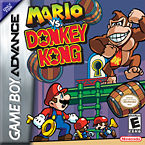 Game Boy Advance |
Mario vs. Donkey Kong is a 2D puzzle platformer and the only game in the series to star Mario as a playable character, putting the rivalry between him and Donkey Kong in the limelight. After seeing an advertisement for Mini Mario toys on television, Donkey Kong rushes to the toy store to buy one of them. He soon learns that the store is out of stock and decides to steal all Minis from the Mario Toy Company across the street, prompting Mario to chase him through several worlds and retrieve the toys.
As it was originally intended to be a remake of Donkey Kong for the Game Boy, Mario vs. Donkey Kong features many of the mechanics present in that game, including Mario's extended moveset consisting of the handstand, backflip and wire spin. During each level, Mario has to carry a key to the goal door and unlock it in the first part, then reach and free a captured Mini Mario in the second part. |
| Mario vs. Donkey Kong 2: March of the Minis | |
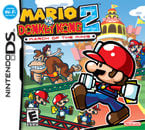 Nintendo DS |
Mario vs. Donkey Kong 2: March of the Minis is an action puzzle game that continues the rivalry between Mario and Donkey Kong with a new story. The newly-renamed Mini Mario Toy Company expands its Mini collection and opens a theme park, inaugurated by Mario and his friend Pauline. Donkey Kong, also present there, kidnaps her out of jealousy for choosing Mario's toy gift over his, taking her to the roof of the building located many floors above. Mario then employs the help of the Mini toys to rescue Pauline. In the same year the game was released, a promotional browser game appeared on the Nintendo Arcade website called Mario vs. DK 2: Cannon Kaos.
The game marks the transition of the series to a style of gameplay reminiscent of Lemmings. In each level, the player has to guide a number of Mini toys to the exit door. They start moving automatically upon tapping them, although they can be kept under control for the remainder of the level using the touchscreen. They can be swept sideways to change their direction or upward to make them jump, or tapped to bring them to a stop. The levels are scattered with various mechanisms, switches or enemies that can be manipulated by the player or the toys themselves to help them progress. Even though levels can be finished with only one Mini left, bringing as many Minis as possible to the goal increases the player's score with a significant amount, awarding them a star rating which contributes towards unlocking extra levels. |
| Mario vs. Donkey Kong: Minis March Again! | |
 Nintendo DSi (DSiWare) |
Mario vs. Donkey Kong: Minis March Again! is a retelling of the game's previous story with a different gameplay. Mario once again sends the Minis to rescue Pauline from Donkey Kong, who has kidnapped her on a whim for being declined a Mini toy after they sold out.
The player no longer has control over the Minis after activating them, and can only modify the environment so that the toys are safely escorted to the exit door. Unlike in the previous game, no Mini has to be lost or destroyed on the way to the goal, as this lowers the amount of retries the player has until they reach a game over. A characteristic mechanic of this game, the Pink Block, has been adjusted from the previous game to be individually removed and placed in special slots throughout a stage, acting as walls or platforms for the Minis. |
| Mario vs. Donkey Kong: Mini-Land Mayhem! | |
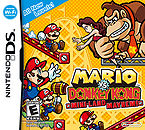 Nintendo DS |
In Mario vs. Donkey Kong: Mini-Land Mayhem!, Mario and Pauline open a new amusement park, the Mini-Land, where the public comes for a chance to obtain the brand new Mini Pauline toy. Donkey Kong arrives late and learns that there are no more of these toys, making him kidnap the real Pauline out of spite. As such, Mario and the Minis set out once again to rescue Pauline on the Super Mini Mario Express, a locomotive which they use to commute from one attraction to the other.
The gameplay takes after the predecessor, in that the Minis start marching uncontrollably after being initiated and the player must form a path for them to the exit, avoiding obstacles and collecting optional items. However, the extra life mechanic is ditched. The key mechanic of the game is constructing various platforms and walls to direct the Minis, making use of a limited stockpile of resources to build them. Red Girders are introduced to the gameplay and would form a main-stay feature in the following titles. |
| Mario and Donkey Kong: Minis on the Move | |
 Nintendo 3DS (Nintendo eShop-exclusive) |
Mario and Donkey Kong: Minis on the Move pauses the conflict of the series' main characters, as Donkey Kong joins Pauline to run a carnival. Although the objective of guiding the Minis to the goal remains intact, it is now presented in a three-dimensional environment with a gameplay influenced by the Pipe Mania video game. In this game, the player must construct a pathway by placing tiles on a field and guide Mini Marios to the goal. Besides the main game, three extra modes and four minigames are available. |
| Mario vs. Donkey Kong: Tipping Stars | |
 Nintendo 3DS / Wii U (Nintendo eShop-exclusive) |
Mario vs. Donkey Kong: Tipping Stars retains many aspects of Mario vs. Donkey Kong: Mini-Land Mayhem!, such as the graphics and the construction gimmick. It is based on the Mario vs. Donkey Kong demo shown at Game Developers Conference in 2014. The story becomes minimal, with Donkey Kong simply kidnapping Pauline to lure Mario and the Minis to a surprise party. Levels created in the editor could be shared online and commented on through Miiverse before it was discontinued. Along with the online functions, the game allows the concept of rewarding other players for their levels by tipping them stars, which form a collectible entity earned according to their performance in a level or by receiving them from other users. The tipper is in turn rewarded with stamps for offering a certain number of stars. In addition, players can use stars to buy new parts for the level editor in the Workshop Store and customize more levels based on the unlocked elements. |
| Mini Mario & Friends: amiibo Challenge | |
 Wii U / Nintendo 3DS (Nintendo eShop-exclusive) |
Mini Mario & Friends: amiibo Challenge is a spin-off that presents no story. Players have to use amiibo in order to play the game, and only certain Super Mario amiibo unlock Mini toys designed after the scanned amiibo. The game contains a general overworld map with levels that can be explored by any Mini. However, some of these levels conceal special exit doors or bonuses that only specific Minis can gain access to using their abilities. An exit attributed to a Mini directs it to a set of levels with mechanics that rely on the character's abilities. Due to the incorporation of amiibo, levels are only played with one Mini at a time, as opposed to managing multiple toys at once like in the previous games. In the same year as the game's release, a browser game on the Play Nintendo website emerged titled Mini Mario & Friends: amiibo Challenge Trivia Quiz. |
Remakes[edit]
| Title | |
|---|---|
| Cover, original release, and system | Description |
| Mario vs. Donkey Kong | |
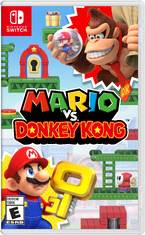 February 16, 2024 Nintendo Switch |
A full remake of Mario vs. Donkey Kong for the Nintendo Switch, released on February 16, 2024. It features enhanced graphics and various quality-of-life improvements to the gameplay. In addition to the six worlds featured in the original game, this remake adds two entirely new worlds, Merry Mini-Land and Slippery Summit, which introduce unique mechanics and level elements. A new Casual Mode is included, which removes the timer from levels and adds checkpoints within them. Cooperative multiplayer is featured for the first time in the series, allowing a second player to join as Toad and aid in completing the game. |
Other[edit]
| Title | |
|---|---|
| Cover, original release, and system | Description |
| Mario and Donkey Kong: Minis on the Move + Mario vs. Donkey Kong: Minis March Again! | |
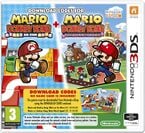 Nintendo 3DS |
Mario and Donkey Kong: Minis on the Move + Mario vs. Donkey Kong: Minis March Again! is a physical bundle with download codes for Mario and Donkey Kong: Minis on the Move and Mario vs. Donkey Kong: Minis March Again! |
Characters[edit]
| Character | ||
|---|---|---|
| Image | Description | |
| Mario | ||
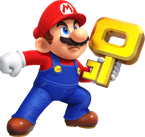
|
The series sees Mario running a company which produces and distributes automated clockwork toys designed after himself and other characters. As the toys prove to be a large success in subsequent games, Mario also opens various theme parks to celebrate them. He is only playable in the first game of the series, where he chases Donkey Kong to retrieve the stolen Mini toys. Here, he exhibits an extensive repertoire of movements including the handstand, backflip and wire spin, much like in Donkey Kong for the Game Boy. Mario has a supporting role in the following games, transporting the Minis to different areas and helping them defeat Donkey Kong without direct involvement. | |
| Donkey Kong | ||
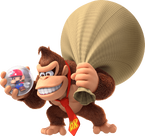
|
Donkey Kong is the main antagonist and the character that rises the action in most games. He presents great interest for the Mini toys and goes as far as to steal the entire stock from the Mario Toy Company in the first game. However, in the following games, his interest is directed to Pauline, whom he impulsively kidnaps out of infatuation. Donkey Kong poses as the boss at the end of each world throughout most of the series, where he often occupies one position from which he sends various attacks at the playable characters. He always comes to terms with Mario and Pauline at the end of each game and even has a protagonistic role in Mario and Donkey Kong: Minis on the Move, where he participates in the activities of other characters. | |
| Minis | ||

|
The Minis are the series' principal unique element of gameplay. They are miniature toy versions of Super Mario characters. As they move automatically, they often need to be guided through a number of obstacles to the exit of each level, which is done by manipulating the environment in various ways. Only Mini-Marios appear in the first game, in which they are stolen by Donkey Kong from the Mario Toy Company. The company expands its production in the sequel with other Minis, namely Mini Peaches and Mini DKs, and subsequent games continue to introduce more Mini characters, although it is unclear whether these are also produced by the Mario Toy Company. Despite their variety, all Minis behave the same in most games. However, in Mini Mario & Friends: amiibo Challenge, Minis take the leading role and are each distinguished by a special ability, except for the Mini Spek which acts like a normal Mini from previous games.
A list of all Minis in the series can be found below. | |
| Pauline | ||

|
Pauline is a friend of Mario and victim of Donkey Kong's kidnapping in several games. She often accompanies Mario at the grand openings of his theme parks, during which she also gets kidnapped. | |
| Toad | ||

|
Toad appears as a playable character in the Nintendo Switch remake of Mario vs. Donkey Kong, where he can complete levels alongside Mario in the added multiplayer mode. In this game, Toad is able to perform the same expanded list of movements as Mario, and also has a few unique attributes, such as being able to pass through one-block tall gaps and climb ropes quicker than Mario by default. | |
| Toads | ||
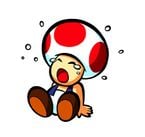
|
Toads of various colors take the role of figurant characters throughout the series. They attend Mario's theme park openings in large numbers and some are also shown to work at the Mario Toy Company. Their only significant role in gameplay is in the first game, where they help Mario bring down Donkey Kong in the final level of the main worlds. | |
Recurring enemies[edit]
| Enemy | |||
|---|---|---|---|
| Image | Description | First appearance in the series | Relatives in the series |
| Shy Guy | |||
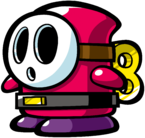
|
Shy Guys are automated toys that simply move from one side to another on the ground. They can generally be defeated by smashing them with Hammers. In Mario vs. Donkey Kong, Mario can stand on top of them, then pick them up and toss them at other enemies to defeat them. In both this game and its successor, the playable characters can also mount Shy Guys and ride them to another place. The enemies are immune to spikes and can thus safely pass the characters over these obstacles. Mounting Shy Guys is no longer possible from Mario vs. Donkey Kong: Minis March Again! onwards, where they become completely harmful. | Mario vs. Donkey Kong | |
| Pokey | |||

|
Pokeys behave just like Shy Guys, gliding from side to side on a platform; however, they are taller. Although completely harmful, they can be defeated by any form of attack, including a Hammer stomp, a Slope Slide and a Cannon shot. | Mario vs. Donkey Kong: Minis March Again! | (N/A) |
| Piranha Plant | |||

|
Piranha Plants are among the few enemies in the series not to appear in toy form. They stand on various surfaces and many of them spit fireballs, which either bounce off an opposing surface and come back into their mouth, or enter another Piranha Plant's mouth and are passed back shortly after. Piranha Plants are invincible in all appearances within the series up until Mario vs. Donkey Kong: Mini-Land Mayhem, where they can be destroyed by any attack.
The first appearance of basic Piranha Plants in the series is Mario vs. Donkey Kong 2: March of the Minis. However, a variation called Tane Pakkun, which shoots seeds that do not bounce back, appeared beforehand in Mario vs. Donkey Kong. |
Mario vs. Donkey Kong | |
| Thwomp | |||

|
Like Piranha Plants, Thwomps are enemies that do not appear as toys throughout the series. They wait the playable character in one place and attempt to crush them with a plummet. In the first game, Thwomps fall quickly to the ground as Mario moves underneath them. In subsequent games, they shake in place for a few seconds before dropping down, which is a result of the less dynamic gameplay. Thwomps are invincible and harmful to touch from any side. | Mario vs. Donkey Kong | |
| Birds | |||

|
Birds fly horizontally across the stage, occasionally attempting to drop eggs on the playable character. In Mario vs. Donkey Kong, they descend a bit and change direction when they encounter a side, and also cannot be defeated in any way. However, in Mario vs. Donkey Kong 2: March of the Minis and Mario vs. Donkey Kong: Minis March Again!, they can be defeated by dropping an object onto them. | Mario vs. Donkey Kong | |
| Donkey Kong's robots | |||

|
These monkey robots are robust toys based on Donkey Kong. Different shapes and types with various capabilities are encountered. Minis can exploit their capabilities to progress through a puzzle or collect bonuses, but the robots can also serve as a hindrance depending on the situation. They are indestructible, but when needed, they can be stunned for a period of time with Hammers or any other sign of attack. | Mario vs. Donkey Kong 2: March of the Minis |
This enemy group encompasses the following: |
Table of Minis[edit]
The following table constitutes the appearances of Mini toys throughout the series:
Gallery[edit]
Trivia[edit]
- All games in the series prior to Mini Mario & Friends: amiibo Challenge were initially released outside Japan, usually in North America, before any other regions. This is due to the fact that all games were developed by Nintendo Software Technology Corporation, which is a division of Nintendo located in North America.
- All of the first seven games in the series can be played on the Nintendo 3DS, as the first game can be played in the Ambassador Program, the second and fourth are Nintendo DS games and thus can also played on the 3DS, the third can be system transferred or bought on the Nintendo eShop, and the fifth, sixth, and seventh are eShop exclusives.
